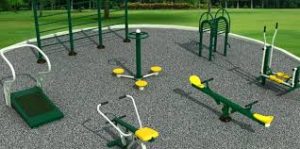Incorporating Commercial Playground Equipment into physical education programs provides significant benefits for children's health, development, and learning. With the rise of childhood obesity and a decrease in physical activity, playgrounds offer a unique opportunity to integrate fun, engaging exercise into daily routines. Here’s how well-designed playground equipment can enhance physical education and support overall wellness.
Enhancing Motor Skills Development
Commercial playground equipment is designed to challenge and develop various motor skills. Structures like climbing walls, jungle gyms, and balance beams require children to use both fine and gross motor skills, which are crucial for physical development. These activities improve coordination, strength, and flexibility. For instance, a study published in the Pediatrics journal suggests that regular physical activity involving gross motor skills can enhance children’s physical health and academic performance by improving their concentration and memory.
Promoting Cardiovascular Fitness
Playground equipment such as swings, slides, and overhead ladders encourages vigorous physical activity that increases heart rate and improves cardiovascular health. Regular use of this equipment helps children build stamina and endurance. According to the American Heart Association, children should engage in at least 60 minutes of moderate-to-vigorous physical activity each day. Playgrounds make meeting this guideline more attainable and enjoyable.

Supporting Healthy Bone and Muscle Development
Activities like climbing and jumping, which are facilitated by playground equipment, are excellent for developing strong bones and muscles. The resistance and impact associated with these activities stimulate bone growth and muscle strengthening, which is essential during the critical growth phases of childhood. The National Institutes of Health report that engaging in such weight-bearing activities during childhood can help prevent osteoporosis later in life.
Encouraging Lifelong Fitness Habits
Playgrounds not only provide immediate physical benefits but also help instill a lifelong appreciation for fitness. By offering a fun and engaging environment, playgrounds reduce the sedentary lifestyle tendencies that are becoming common among children. This playful approach to physical activity makes exercise a regular part of children’s lives, setting the foundation for healthy habits that can last a lifetime.
Improving Social and Emotional Health
Physical education through playful means also supports social and emotional development. Playground equipment often requires children to take turns, share equipment, and work together to navigate features or play games. These interactions boost social skills, teach conflict resolution, and promote teamwork. Furthermore, physical activity is known to reduce symptoms of depression and anxiety in children, enhancing their overall emotional well-being.
Adapting to Diverse Needs
Modern playground equipment is increasingly designed with inclusivity in mind, ensuring that children of all abilities can participate in physical activities. Features like wheelchair-accessible swings and sensory-friendly elements allow children with diverse physical and sensory needs to enjoy and benefit from playgrounds, making physical education more accessible and equitable.
In conclusion, commercial playground equipment plays a pivotal role in supporting physical education by providing safe, engaging, and beneficial exercise opportunities. This equipment helps develop essential motor skills, promotes cardiovascular health, and encourages social and emotional learning. By integrating fun and fitness, playgrounds can significantly contribute to the physical and psychological health of children, fostering a healthier, more active generation.